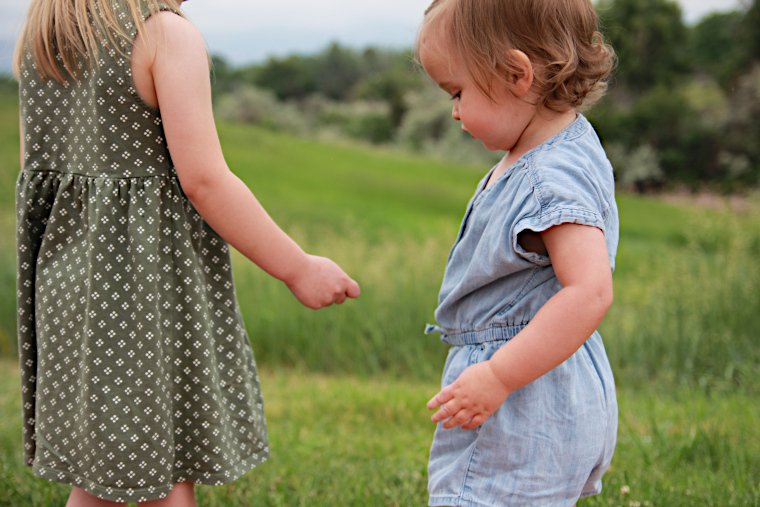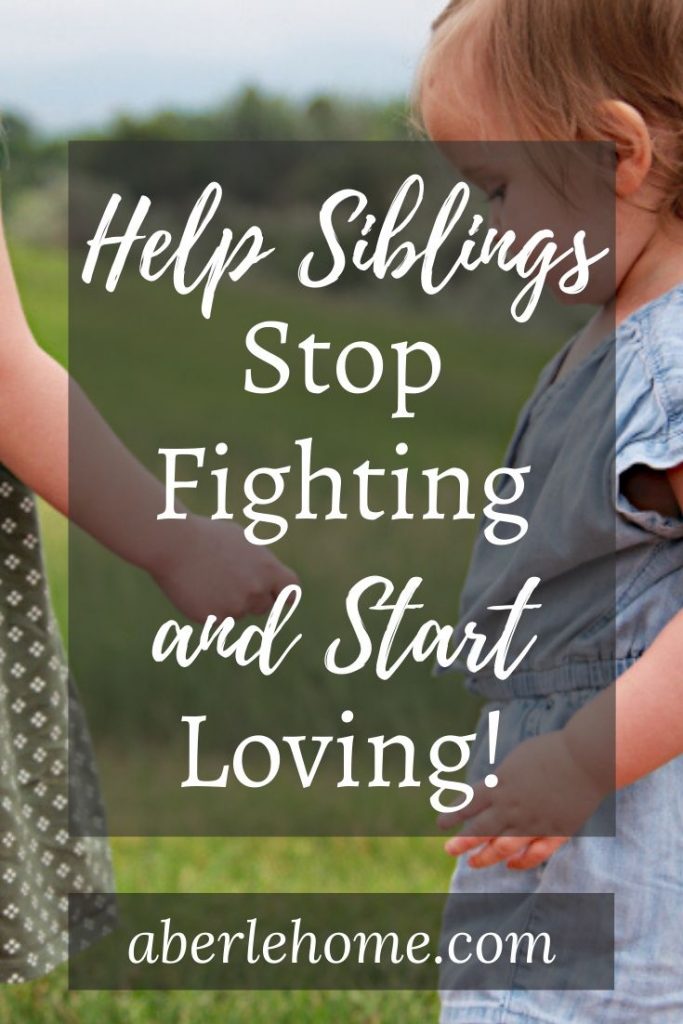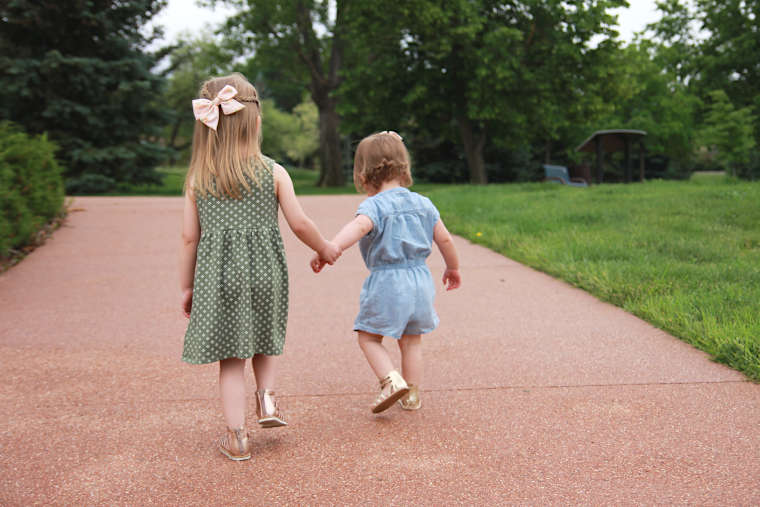
This post may contain affiliate links. See my full disclosure. As an Amazon Associate, I earn from qualifying purchases.
Cultivating loving sibling relationships in the home can be a huge challenge in parenting. My husband and I are realizing this already with our two- and three-year-old daughters. One minute they are best friends pretending to go on a grocery shopping trip with their play shopping cart and baby dolls, the next moment I’m startled by blood-curdling screams coming from their bedroom.

I remember the fights between my own sisters and me growing up. I was the oldest, the rule follower, and the boss. I believed it was my responsibility to keep the others in line, but for some reason, they didn’t see the value of having a second “mom” lording over their misdemeanors.
Then there were all the little ways we would provoke each other for our own amusement. I would frequently blow a big puff of air across our homeschool table and wait the 1.5 seconds it took for my sister’s hair to fly out of place when the air finally reached her. This really helped her to concentrate on her lessons, I’m sure.
And that’s not even the half of it. All the while, our poor parents: “GET ALONG, GIRLS.”
I know how my parents were feeling now that I’m a mom myself. I love each of my children, and I want them to feel the same love for one another.
Thankfully, my sisters and I now enjoy the fruit of our childhood relational learning ground, and I’m so thankful for the friendship we share! Despite the squabbles my own children face, I’m encouraged when I remember that the relational skills they are developing now alongside their siblings will give them greater relational competence later on.
At least that’s what I’m hoping, anyway!
Are you facing the same struggles with your own kids? Here are some tactics to help siblings stop fighting and start loving each other.

Ways to Help Sibling Stop Fighting and Start Loving
Spend time playing with your children to guide their interactions. Get in the trenches with them. As soon as a conflict arises, teach them how to communicate gently and to problem solve calmly. Teach them how to compromise when they need to. They may just lack the skills to be kind, to take turns, to share, or to communicate effectively without lashing out.
Try to role-play situations when possible to reinforce these skills. Show them to be mindful of the needs and desires of the other. “Little sister is trying to take your teddy bear? Let’s find her a special stuffed animal too.”
Do not tolerate physical aggression or a mean spirit. The habit of lashing out in anger and aggression can take first in line when it comes to a child’s interpersonal skills.
We provide a suitable consequence to destructive behavior and we try to follow through every time. We want our children to understand that it is not okay to hurt a sibling.
Praise and encourage their good interactions. Make them aware of the times when they are working or playing together well.
Remove the cause of conflict. For two children, sometimes just taking away the object they are fighting over will be enough incentive for them to put forth effort to work with each other.
Allow your kids certain possessions or spaces that they don’t have to share. I want my children to learn to respect the property and boundaries of one another. For this reason, although we do work on sharing quite a bit, I don’t force my children to share every single thing.
They have certain special toys, like their dolls, that they can keep to themselves if they want. They have dibs on any toy they found from the toy basket first until later when they set it down. They can learn to ask permission before grabbing a toy from a sibling.
From this place, my children have an opportunity to learn to share of their own belongings from a heart of true generosity.

Plan activities for your kids to enjoy together. Doing a project together with Mom or Dad, decorating together for an upcoming holiday, or going on an outing together will take off some pressure and help them build fond memories and good rapport with one another apart from the challenges they face. Look for chores around the home that they can accomplish together as a team.
Watch that you don’t compare your children with each other. I’ve caught myself making comparisons between my children to show a point (i.e. You need to be more tidy. Look at your sister; she doesn’t make such a mess!), but comparisons will only cause more problems in the long run.
Comparisons could foster bitterness, competition, and envy between siblings if one child believes he cannot measure up to a sibling in the eyes of Mom and Dad.
Don’t encourage the older child to be the boss or rule keeper. We avoid telling our oldest to check on her younger sister to see if she’s behaving, and we are working on teaching her that she is not the boss of her sister—her sister is free to play how she wishes, and mom and dad will enforce the rules.
An older sibling who is always trying to control the younger or tattling to make them behave (ahem, me as a child) will only frustrate the younger. The children should know that they have equal footing before their parents, and equal importance in the family. They should take care of each other.
Set a good example as a parent. My girls watch (and later imitate) my responses and reactions when I am frustrated or under stress. They can learn a lot about self-control (or my lack thereof) and my attitude toward others by watching me. Do I speak poorly about others in their presence? Do I model good, productive communication during a disagreement with my husband? They can also learn generosity by watching me share the good things I have with them and others.
Look for a solution to a deeper issue. Sometimes kids lash out because they are harboring bitterness for an underlying issue. Telling them to “stop fighting” just doesn’t provide a working solution for them.
Is one child getting more of Mom and Dad’s attention and the other is trying to compensate? Is one child messy and the other particular and needs their boundaries respected by a sibling? Is there unhealthy competition between them that can be worked though? Is one child bullying the other or always trying to control the other?
Whenever I can, I try to give focused attention to each of my children individually to fill their cups and meet their needs. Even a little one-on-one time goes a long way!
Make it a family practice to intentionally love and serve one another. Pull one child aside to help you surprise another child by doing one of their chores for them.
Mention out loud the individual attributes you love about your children and others often and encourage them to do the same.
Write cards to a family member from everyone for his birthday with handwritten notes of kindness and encouragement for the year ahead. Help your kids buy or make gifts for each other for birthdays and holidays.
Pray out loud for each other for needs. Try keeping a family journal on the coffee table to write out fun memories you’ve shared.
You may enjoy my other post: Ways To Teach Your Child to Serve Others.
Conclusion
With some intentionality, we as parents can help our children overcome relational challenges with their siblings.
Our kids’ lives will be richer in the long run because of the love they share with their siblings!
What are some strategies that have worked in your home to help your children in their relationships with each other?

So many helpful tips! I especially appreciated your encouragement to look for the deeper issue, since so often the outward behavior is just a symptom of a heart issue.
I shared your post link in my Shareworthy Saturday post today since I know it will be helpful for my readers. Thank you!
Debbi, thank you so much for reading and sharing the post. I hope it helps your readers!